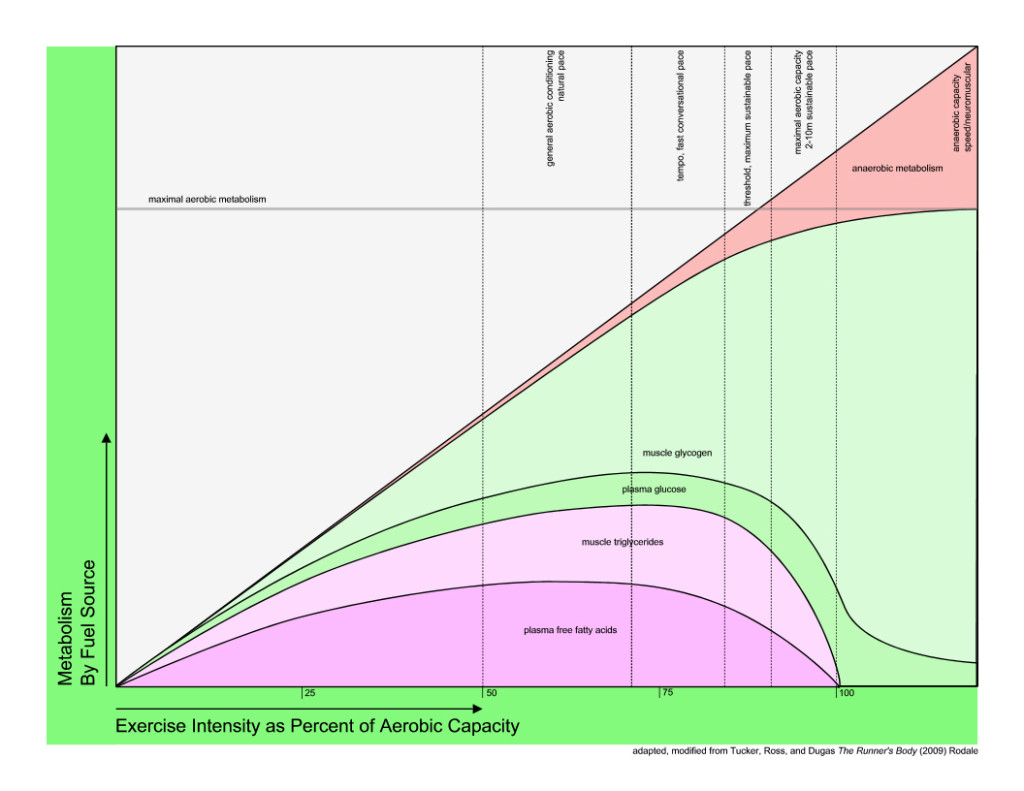All Recovery Nutrition is Not Created Equal
All Recovery Nutrition is Not Created Equal
By Chris Newport, Nutritionist and Head Coach
As endurance athletes, we all know that PRs are made in the kitchen. Get your nutrition wrong and you can end up sore, sick, underperforming, injured, depressed, or constantly (or not at all) in the port-o-john. Get it right, and it could make all the difference in physically and mentally performing well. This is especially the case with recovery nutrition.
Periodize your Nutrition
When I initially start working with my athletes or nutrition clients, 99% of them eat the same thing EVERYDAY. But their training varies day to day. So if your training is periodized (broken into cycles in order to improve performance), then why shouldn’t your nutrition be periodized? In other words, what you eat and/or drink before, during and after workouts should vary according to your goals, where you are in your season, the weather, the time and intensity of your workout, and any special considerations (allergies, intolerances, sensitivities, food preferences or aversions, food availability, etc).
Training is All About Recovery
So let’s START with recovery nutrition. Why start with what happens at the end of a workout? First of all, keep in mind that fitness is a breakdown process. In order to improve, you need to break yourself down adequately, then recover. In other words, training is all about recovery. So if you want your next workout to go well, then start with recovery.
Energy Systems and Fuel Sources
First, it’s important to understand that various exercise intensities are fueled by different sources (although not exclusive of one another). Lower intensity, longer duration activities require fat (in the form of muscle triglycerides, plasma free fatty acids, and lipid reserves) while higher intensity, shorter duration activities require carbohydrates (in the form of plasma glucose and glycogen from the muscle and liver).
Clearly, glycogen is important. So what is it? Glycogen is your body’s limited carbohydrate energy reserves used for moderate to high intensity exercise. A typical 154lb male has ~600 calories of glycogen after an overnight fast or ~1500 calories when well fed or ~1800-2000 calories after “carb loading.” Think of it as your high octane gas tank. You use the fuel to perform well, but you also need to refill it. If your glycogen “tank” runs out, the results can be disastrous. Have your ever “hit the wall” or “bonked?” Yeah…then you know what I mean. If your glycogen tank is not completely full going into a race or high intensity workout, you’ll suffer.
Recovery Nutrition Needs Vary
The purpose of recovery nutrition is to restore glycogen and replace lost fluid and electrolytes from sweat. Consume ~150% of fluids lost (pre and post weigh ins work great here), which generally is greater in the warmer months. Also, consider how glycogen depleting your workout was and how often you’re training. Did you just do your usual comfortable 4 mile run around the block? Not very glycogen depleting (nor was it challenging your fitness). Did you just do 800m VO2Max repeats at the track (i.e. very high intensity) or a half iron distance triathlon? Then you definitely reduced your glycogen reserves. But if you plan to do another workout that day, restoring glycogen is essential. However, if you just finished a race and plan to hang out on the couch for the next 2 week, don’t stress about it. In other words, longer and higher intensity workouts will reduce your glycogen stores the most in addition to frequent training sessions (2 workouts per day or more than 5-6 workouts per week). For less frequent training and lower intensity workouts, consuming your usual healthy meals and snacks and you’ll be just fine.
How Do We Replace Lost Glycogen?
With carbs…and a little protein. Since fat delays carbohydrate delivery to the body (in turn slowing the conversion to glycogen), save it for your next meal in a couple hours. To replace glycogen the fastest, consume carbohydrates within 30 minutes post workout, although the optimal “window of opportunity” is about 2 hours. However, the earlier and more frequently you consume carbs (for example, sipping your post workout beverage frequently rather than chugging it all at once), the faster you’ll rebuild your glycogen reserves (source). Aim for consuming ~1g of carbs per kilogram of bodyweight in liquid or solid form (source).
Would I prefer to see healthy carb choices? Sure. Antioxidants in the form of real food (which is highly powerful in it’s ability to heal) as recovery nutrition is definitely under researched. But here’s where you can sneak in your favorite soda or candy (just skip the nasty food dyes and fake sugars…and don’t tell your dentist), since high glycemic index foods appear to replace glycogen faster (source). However, recent research suggests adding .3g of protein per kilogram of bodyweight results in accelerated glycogen resynthesis and possibly reducing soreness (source). Chocolate milk has been the latest rock star (thanks to research from the National Dairy Council) since it has a great ratio of carbs and protein in addition to replacing fluid and electrolytes (source).
Practical Considerations for Recovery Nutrition
There are several things to consider when it comes to recovery nutrition. First, does it taste good? If not, you’re less likely to eat it. Is it available? There are plenty of races that have excellent recovery nutrition options (unless you’re the last one across the finish line). But what about those events in the middle of nowhere? It’s important to consider planning and appropriate food storage if you have a favorite recovery food or drink. What’s the cost? Chocolate milk is a far cheaper (and arguably tastier) option than a similarly engineered nutrition product (and there are TONS on the market). But if you’re lactose intolerant or allergic to dairy, there are plenty of other options like egg whites, jerky, soy milk, bananas, fig newtons and more. Check out our Cherry Blueberry Recovery Smoothie here as well as our Recovery Nutrition Guide & Recipe Book here with tons of great info AND colorful recipes you can download right now!
Here’s Coach Chris with her post race burger, as an example (and yes, that’s a big smile!)

So What Does This Mean For You?
Fueling plans are highly individualized based on your goals, needs, bodyweight, preferences and more. Have a plan, be flexible and be sure to hydrate and consume carbs frequently after a high intensity or long workout.
Ready to work with our Sports Nutritionists?
Learn more here to book a free consult. We can also help using our metabolic testing to determine your fueling needs!




